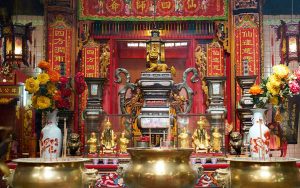
Taoist rites stand out for their elaborate rituals, symbolic objects, and deep cultural roots. Taoist funeral services are about bidding farewell, and spiritual journeys meant to guide the departed soul to the afterlife while protecting the living from misfortune. The blend of religion, folklore, and family tradition makes these funerals unique, yet also complex to organise. For those unfamiliar, it’s easy to assume these services are about incense, chanting, and colourful robes. But behind the ceremonial grandeur are layers of meaning, unexpected practices, and even ethical dilemmas. In this article, we’ll unpack the shocking facts, reveal the little-known secrets, and explore the ethical considerations that shape modern Taoist funerals in Singapore.
What Many Don’t Realise About Taoist Funerals
The scale and symbolism of Taoist funeral services often surprise those who encounter them for the first time. One striking fact is the number of rituals performed over several days. Unlike some religious services that take place in a single afternoon, Taoist funerals can span three, five, or even seven days, depending on the family’s traditions and budget. Each day carries its own set of chants, offerings, and symbolic acts intended to ensure the safe passage of the soul.
Another lesser-known detail is the use of elaborate paper effigies, ranging from houses and cars to servants, burned to provide the deceased with comfort and status in the afterlife. While these offerings may look decorative, they are deeply rooted in beliefs about continuity between the living and the dead.
There’s also the matter of location. Taoist funerals can be held at HDB void decks, private funeral parlours, or even within family homes. Each setting influences how rituals are conducted, from the size of the altar to the arrangement of ceremonial musicians. For some, this accessibility is reassuring; for others, the public nature of void deck funerals can feel overwhelming.
The Subtle Details You Might Miss
Beneath the visible rituals are practices that only insiders tend to notice. For example, in many Taoist funeral services, family members are assigned specific roles according to their birth order and gender. Eldest sons may lead certain rites, while daughters participate in supportive roles, reflecting traditional values.
Another subtle but significant detail is the strategic placement of ritual objects. From the exact position of the coffin to the direction the incense sticks face, every element is intentional, often guided by a geomancer to ensure good fortune for the living.
The chanting performed by Taoist priests is also a solemn background to the ceremony and a spiritual dialogue. Each recitation has a purpose, whether it’s guiding the soul away from earthly attachments or warding off negative entities. Many families do not realise that the sequence of chants can be customised based on the deceased’s age, status, and even cause of death.
Even the food offerings, often overlooked by guests, carry meaning. Dishes are selected for taste and symbolic value, such as longevity noodles for a wish of continued blessings in the afterlife.
Balancing Belief and Modern Realities
While traditions are central to Taoist funeral services, modern Singapore presents new ethical questions. One is the environmental impact of the large-scale burning of paper offerings. The practice remains significant for many families, but it has also raised concerns about air quality and sustainability. Some funeral providers now offer virtual offerings or smaller-scale burnings as a compromise.
Another sensitive issue is cost. In funeral services in Singapore, elaborate Taoist rites can be expensive, with expenses covering ceremonial items, priest fees, musicians, and extended venue use. Families sometimes struggle between honouring tradition and managing financial strain. The pressure to “do right” by the deceased can lead to overspending, especially when cultural expectations clash with economic realities.
The inclusion or exclusion of certain rituals can also spark family disagreements. Younger generations may prefer simplified ceremonies, while elders insist on full rites. This tension can be emotionally taxing at a time when unity is most needed. The challenge lies in finding a respectful middle ground that honours the deceased while accommodating differing beliefs.
Honouring Tradition While Moving Forward
Arranging funeral services in Singapore for a Taoist farewell is a journey through rich traditions, symbolic gestures, and deeply held beliefs. Ultimately, Taoist funeral services are about the connection between generations, between the living and the departed, and between cultural heritage and contemporary life. By understanding the depth of these rites, families can make informed choices that respect both tradition and practicality, ensuring the farewell is both meaningful and sustainable. The right guidance can help you honour your loved one without unnecessary stress or conflict.
If you’re planning a Taoist funeral and want to balance tradition with modern needs, speak to Casket Fairprice today.







